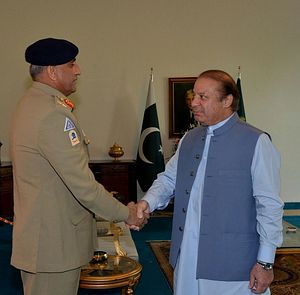In November last year, a report on a closed-door high level security meeting between the country’s military and civilian leadership, published by Pakistan’s leading English language daily, Dawn, enraged the country’s military. To assuage the powerful military, the civilian government not only removed the then-information-minister, but also formed an inquiry committee to probe how the content of the meeting became public.
Following the inquiry committee’s recommendations, Pakistani Prime Minister Nawaz Sharif last month removed two senior foreign office officials who were allegedly found responsible in the leak. However, on April 29, the military in Pakistan, in a social media message, “rejected” the Prime Minister’s office notification that removed two high level officials by saying that the recommendations of the Dawn inquiry board were not implemented fully therefore notification was rejected.
“Notification on Dawn leak is incomplete and not in line with recommendations by the inquiry board. Notification is rejected,” said the military’s media wing in a Twitter message. On May 9, the military’s information office, in a surprise press briefing, announced that the recommendations of the Dawn inquiry committee report which were “duly approved by the Prime Minster, have been implemented, which has settled the Dawn leaks issue.” The press brief further said that the initial “Twitter post stands withdrawn and has become infructuous.”
Contrary to the popular belief that the forces of democracy have won, the military’s decision to withdraw its own notification, has only achieved the opposite. The Army’s outright rejection of the country’s elected civilian government’s authority has intensified decade’s long debate related to the fundamental imbalance between the military and civilian institutions.
The development related to the military’s voluntary withdrawal of its own notification, openly challenging the country’s prime minister’s decision, has come in the wake of a marathon-length meeting between Sharif and the Chief of Army Staff, General Qamar Javed Bajwa.
So what happened during the meeting between them that led the military into taking back its strongly worded message?
On the whole, it’s a negotiated settlement between the ruling civilian and military elite. While the civilian government whose leadership appears politically isolated after the Supreme Court’s verdict in the Panama Papers corruption scandal, the military’s open challenge to an embattled Prime Minister, in no way, serves the institution’s own broader interests
The military’s initial message to the government was a stark reminder that the Prime Minister had no option but to fulfill the terms that were jointly agreed upon behind closed doors. The eventual withdrawal of the initial muscular response only came after the military had achieved its strategic objective of enforcing the complete implantation of the recommendations made by the Dawn inquiry board.
Arguably, the military’s current position of openly supporting democracy by terming the constitutional role of the prime minister as the “final authority,” only proves that the civilian government’s mere survival depends on maintaining the military’s support for its regime.
With the next general elections drawing closer, it was expected that opposition political parties will react to the recent civil-military showdown in favor of the military establishment. The opposition in the country has demanded that the government make public the Dawn leaks inquiry report, which the government and the military have termed an entirely “settled issue.”
Apparently, on the military’s part, there has been a realization that an open conflict between civilian and military elites at this point only raises challenges that the country faces internally and externally. Therefore undermining an embattled prime minister’s authority, which has nothing to offer besides remaining at the mercy of the military, can actually distract both institutions’ leadership from focusing on the imminent security and economic challenges facing the country.
It is ironic then that a civilian government that enjoys the democratic mandate of its people is looking to sustain the military’s support to prove its legitimacy. In response to the military’s decision of questioning the prime minister’s decision, the government has not issued any statement or taken any action to establish its authority or constitutional jurisdiction. On the other hand, however, it’s the civilian government that has approached the military for rapprochement, which precisely proves its vulnerability and isolation. In this context, the military’s decisions underline its influence and domination as an institution in the country’s political and security affairs, which overshadow the role of all other institutions.
The military’s public support for Sharif’s civilian government offers the latter enough political space to confront boiling political opposition before reaching the next general elections. Moving forward, the civilian government is not likely to face any pressure from the military, which gives it adequate flexibility to confront other political challenges at hand.
However, it’s unfortunate that even after nine years of direct civilian rule, democracy as an institution remains as vulnerable and weak as it was at any time in Pakistan’s history.

































